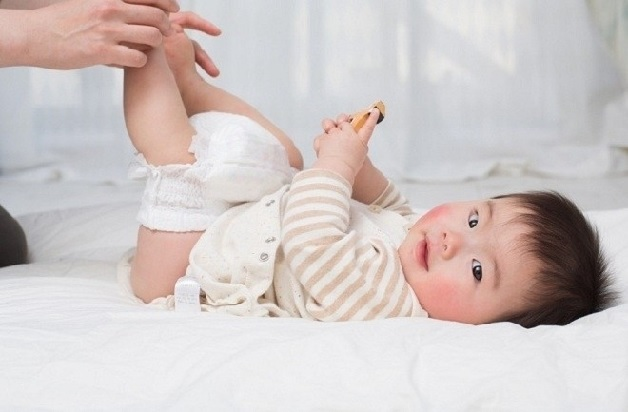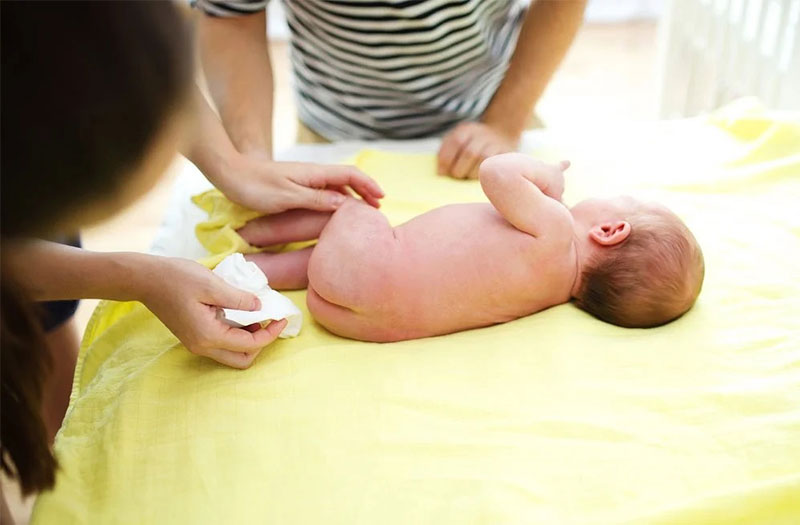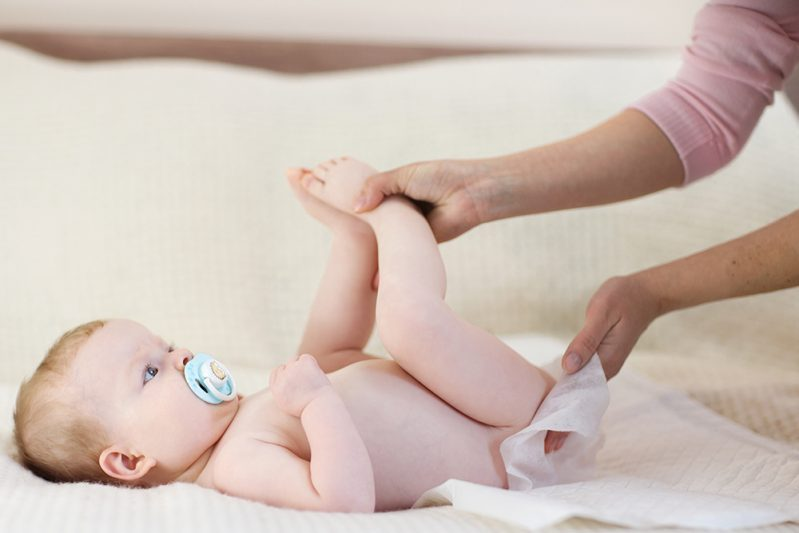Do babies have foamy stools to worry about?
How is it normal for a newborn to have a bowel movement?
The number of bowel movements of babies is different, depending on the nutrition regime. Normally, exclusively breastfed babies have bowel movements 5-6 times a day, the stools are usually mustard yellow, soft and have a slightly sour smell. For formula-fed babies, the number of bowel movements can usually be less, about 1-3 times a day, the stools are usually green or yellow-brown, hard and have a stronger smell.
Should babies have foamy stools to worry about? (Illustration)
When an infant has a bowel movement, there is foam
If your baby has diarrhea or has a bowel movement, he or she will have more bowel movements a day, usually three or more times. Newborn babies have small, effervescent green foam and mucus. The stools are initially flat and then gradually become foamy. Therefore, when the condition is foamy stools (may be accompanied by green mucus), parents need to closely monitor.
If it persists and is accompanied by other symptoms, it is necessary to quickly bring the baby to the hospital for timely diagnosis and treatment, and to limit dangerous complications. However, in some other cases, although the baby may have foamy stools, the frequency remains the same, there are no other abnormal signs in the stool, the baby still eats and sleeps well, does not cry for no reason. …then parents can rest easy because this situation will probably go away after a few days.
In addition, because the baby’s digestive system is not yet complete, the infant has foamy stools accompanied by fussiness, weight loss, it is possible that the baby has intestinal dysbiosis, digestive disorder or intestinal infection. Your baby’s poop will have the following properties:
– Stool is dark green, small amount and mixed with mucus.
– The stools may be hard and covered with mucus or blood, which may indicate that your baby is constipated.
– Stools may be of a pea-like nature, mixed with mucus and green in color, possibly indicating an intestinal infection.

Foamy stools in infants may be due to an immature digestive system. (Illustration)
Causes of foamy stools in babies
The baby’s digestive system is not yet fully developed
The urinary and intestinal functions of newborn babies are not yet fully developed, leading to foamy bowel movements. If your baby’s stools are a little loose, with mucus and foam, the baby’s intestines may be irritated, the baby has not digested all the sugar in the milk.
Because the baby has an intestinal infection
Some bacteria can cause foamy stools with diarrhea in infants such as Salmonella, Campylobacter or E.coli, Staphylococcus, .. If the baby is more severe, cramps or fever may occur. Parents need to take their baby to see a doctor right away.
Baby has a milk allergy
Some babies may be allergic to milk proteins, leading to foamy stools and diarrhea. Symptoms of a milk allergy include: abdominal pain, blood in the stool. In more severe cases, a milk allergy can cause hives, difficulty breathing, and swelling.
Due to mother’s diet
If the baby is nursing mother milk Absolutely, the mother’s diet can also affect the baby. If the mother eats laxative foods, the baby may have foamy stools.
Due to malabsorption syndrome
Some babies with malabsorption syndrome also lead to foamy stools because nutrients have not been fully digested.
Because the baby is in the weaning phase
Some 5-6 month old babies will enter the weaning phase with new foods such as flour, porridge, and pureed vegetables… It is this new menu that may lead to the baby’s diarrhea. foam in the beginning. However, parents can rest assured because this is a completely natural and normal reaction that will go away after a period of weaning.
Is it dangerous for babies to have foamy stools?
Foamy stools are common in newborns and are fairly easy to treat. However, parents need to be equipped with knowledge to care for children or closely monitor, treat early, this condition will gradually decrease and leave no dangerous complications.

Foamy bowel movements in infants are worrisome. (Illustration)
When passing loose and foamy stools for a long time, it will make the baby lose water quickly, fatigue, can lead to dangerous complications such as organ failure, respiratory failure… The diseases that cause this condition need to be diagnosed early, treated promptly, so parents must monitor to take the child to a medical facility if there are abnormal signs.
What to do when a newborn baby has foamy stools?
For children who are breastfed, mothers need to adjust their own proper nutrition, eat lots of fresh vegetables and fruits, drink coconut water, yogurt… to increase the amount of vitamins and minerals needed for the baby. child. Besides, the mother must eliminate and limit fast food, greasy food, which is not good for health.
For formula-fed babies, they may have foamy stools for 2-3 days when they first take it because the digestive system needs time to adapt. However, if this condition persists, the mother should choose another lactose-free milk that is easy for the baby to digest.
When developing babies with foamy stools, the most important thing is to rehydrate the baby by feeding them several times a day. After each bowel movement, give your baby about 50-100ml of oresol in addition to breast milk and formula. Electrolyte rehydration solutions will help keep your baby from becoming dehydrated. However, it is necessary to consult a doctor about the issue of giving water to infants.
In the following cases, you need to take your baby to the doctor right away:
– The baby has had effervescent defecation for 2 days and does not go away.
– Newborn babies have green foam and mucus, bloody stools.
– The baby is tired, refuses to eat, has a high fever.
The baby’s body shows signs of severe dehydration.
How to prevent babies from having foamy stools
– Make sure baby items are clean: Baby-related items such as bottles, pacifiers or toys… This will help minimize the attack of harmful bacteria through the respiratory and digestive tracts. Parents or family members who come into contact with babies also need to wash their hands often and disinfect them.
– Mother’s nutrition: As shared, the mother’s nutrition affects the quality of milk that the infant absorbs every day. Therefore, mothers should ensure nutrition right in their daily meals.
– Additional nutrients: For children who are entering the weaning stage, parents need to add vitamins from fresh vegetables and fruits to a balanced meal, full of nutrients and a scientific diet. Along with that, parents also need to pay attention to food allergies in meals to avoid children having digestive disorders.
at Blogtuan.info – Source: Eva.vn – Read the original article here





